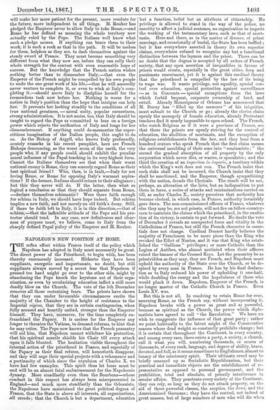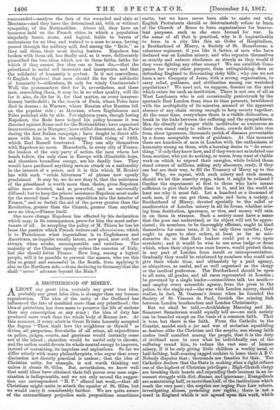NAPOLEON'S NEW POSITION AT HOME. T HE reflex effect within France
itself of the policy which Napoleon has adopted in Italy must necessarily be great. The direct power of the Priesthood, to begin with, has been thereby enormously increased. Hitherto they have been .suppliants, energetic and importunate, no doubt, but still -suppliants always moved by a secret fear that Napoleon if pressed too hard might go over to the other side, might by abandoning the Pope knock the keystone out of their orga- nization, or even by secularizing education inflict a still more deadly blow on the Church. The vote of the 5th December .removes all those restraining fears. The priests have shown that they can under favourable Circumstances excite the majority of the Chamber to the height of resistance to the Imperial regime, that they are in certain contingencies, when fully aroused and heartily united, stronger than the Emperor himself. They have,' moreover, for the time completely en- franchised the Papacy. It is useless for the Emperor any longer to threaten the Vatican, to demand reforms, to hint that he may retire. The -Pope now knows that the French peasantry will aid him, that Napoleon cannot withdraw his protection, that his spiritual mantle shields his Chair till every attack .upon it falls blunted. The hesitation visible throughout the internal action of the priesthood in France, and especially of the Papacy as their final referee, will henceforth disappear, and they will urge their special projects with a vehemence and a pertinacity of which since the expulsion of Charles X. we have had few examples. This spirit thus let loose must be and will be an almost fatal embarrassment for the Napoleonic .dynasty. More steadfastly even than the Bourbons—whose conduct in this respect has always been misrepresented in England—and much more steadfastly than the Orleanh3ts, the Napoleons have maintained the great political dogma of France, that the State is above all interests, all organizations, .all creeds ; that the Church is but a department, education but a function, belief but an attribute of citizenship. No privilege is allowed to stand in the way of the police, no sanctity to affect a judicial sentence, no organization to impede the working of the testamentary laws, such as that of mod- main. Here and there, as in the matter of divorce, of priest marriage, and occasionally of burial, the State has been baffled ; but it has everywhere asserted in theory its own superior claims, everywhere refused to recognize any but a functional distinction between the layman and the priest. There can be no doubt that the dogma is accepted by all orders of French society, that any open assertion of inequalities in favour of priests would create, especially in the great cities, deep and passionate resentment, yet it is against this cardinal theory that the priesthood is compelled by the law of its being to wage war. It wants privilege, not equality, special con- trol over education, special protection against surveillance — as in Convents — special exemptions from the laws which forbid bequest, corporate ownership of land, and entail. Already Monseigneur of Orleans has announced that M. Duruy has "filled up the measure" of his iniquities, must submit to the Church or go ; already the clerics claim openly the monopoly of female education, already Protestant teachers find it nearly impossible to open school. The French, who watch Belgium as if it were a province of France, see that there the priests are openly striving for the control of education, the abolition of mortmain, and the exemption of religious establishments from the law, and they hear from a hundred orators who speak French that the first claim means the universal moulding of their sons into "seminarists ; " the second the gradual absorption of all property by the only corporation which never dies, or wastes, or speculates ; and the third the creation of an imperium in imperio, a territory within which the ting's writ does not run. The French insist that such risks shalt not be incurred, the Church insist that they shall be sanctioned, and the Emperor, though sympathizing with the nation, dreads the Clericals. The result will be not, perhaps, an alteration of the laws, but an indisposition to put them in force, a series of attacks and recriminations carried on till, as under, Charles X., society perceives that authority has become clerical, in which case, in France, authority invariably goes down. The non-commissioned officers of France, whatever else they may be, are not priests, will not fire on fellow-country- men to maintain the claims which the priesthood, in the exulta- tion of its victory, is certain to put forward. No doubt the vote of December 5 reveals an unexpected force and vitality in the Catholicism of France, but still the French character in essen- tials does not change. Cardinal Donnet hardly believes the majority of Frenchmen to be more pious than the King who revoked the Edict of Nantes, and it was that King who estab- lished the " Gallican " privileges ; or more Catholic than the Legion of Antibes, who almost mutinied when their officers raised the banner of the Crossed Keys. Let the peasantry be as priestridden as they may, they are French, and Napoleon must uphold the authority of the State over the Church, or be de- spised by every man in France. He has by his final declara- tion as to Italy reduced his power of upholding it one-half, while doubling the energy and the hopefulness of those who would pluck it down. Napoleon, Emperor of the French, is no longer master of the Catholic Church in France. Even Louis XV. was.
But this is not all. In resolving to retain Rome for ever, annexing Rome, as the French say, without incorporating it, Napoleon breaks with a power as great and as powerful, because as spiritual as the Church, the power which diplo- matists have agreed to call "the Revolution." We have no wish to exaggerate the influence of that great party ; rather we point habitually to the latent might of the Conservative masses whose dead weight so constantly prohibits change ; but it is certain that throughout the Continent, in every country, and among every race, there exists a party, a society, a church, call it what you will, numbering thousands, or scores of thousands, of every rank, language, and degree of ability, brave, devoted, and full, as it seems sometimes to Englishmen, almost to lunacy of the missionary spirit. Their ultimate creed may be briefly summed up as Socialistic Republicanism, but their practical and immediate objects are the establishment of re- presentative as opposed to personal government, and the prohibition, total and absolute, of priestly interference in secular affairs. They penetrate every society of the Continent, they can rely, so long as they do not attack property, on the aid of three powerful classes, the sceptics, the Jews, and the Americanized Germans ; they have the control, not indeed of great masses, but of large numbers of men who will die when. commanded—analyze the lists of the wounded and slain at Mentana—and they have the determined aid, with or without sympathy, of the Nationalities. Above all, they have an immense hold on the French cities, in which a population singularly brave, acute, and logical, liable to bursts of enthusiasm for an idea, and trained to a man to arms, having passed through the military mill, find among the "Reds," as they call them, their most daring leaders. Napoleon has broken with them all, has finally and, as it were, deliberately proscribed the two ideas which are to them faiths, faiths for which if they cannot live they can at least die,—that the priesthood is social evil incarnate and incorporate, and that the solidaiitd of humanity is perfect. Is it not marvellous, 0 English Squires! that men should die for the solidarite of humanity ?—ridiculous, fit only for windy Continentals ? Well, the protomartyrs died for it, nevertheless, and these men, resembling them, it may be, in no other quality, will die for it also, do die for it, for that matter, on every insurrec- tionary battle-field ; in the streets of Paris, where Poles have died in dozens ; in Warsaw, where Russian after Russian fell on the popular side ; at Mentana, where Englishmen and Poles perished side by side. For eighteen years, though hating Napoleon, the Reds have helped his policy because it was directed against Rome and for the Nationalities; have organized insurrections, as in Hungary; have stilled discontent, as in Paris during the first Italian campaign ; have fought in direct affi- ance with him, as in the unhappy Polish rising of 1863, which Earl Russell frustrated. They can ally themselves with Napoleon no more. Henceforth, in every city of France, the leaders of the only party of action, the men whom hot heads follow, the only class in Europe with illimitable hope, and therefore boundless energy, are his deadly foes. They would have pardoned anything save an attack on a nationality in the interest of a priest, and it is this which M. Rouher has with such "crude bitterness" of phrase now openly proclaimed. It may be, we do not deny it, that the assistance of the priesthood is worth more than theirs, gives Napoleon allies more devoted, and as powerful, and as universally diffused; but to keep the priests' assistance Napoleon must make for the second time "a Roman expedition into the interior of France," and so forfeit the aid of the power greater than the Revolution, greater than the Church, greater than anything save an idea,—France itself. _ One more change Napoleon has effected by his declaration which may, in its consequences, prove for him the most unfor- tunate of all. In accepting the policy of M. Thiers he has let loose the passion which French writers call chauvinism, which is to Frenchmen what imperialism is to Englishmen and Americans, an impulse usually latent, now good, now evil, but always, when awake, unconquerable and resistless. The majority of the Chamber openly orders the coercion of Italy, lest she should fetter France. How long, among a logical people, will it be possible to prevent the masses, who see this idea so grand and successful in the South, from applying it also on the Northern side,—from declaring to Germany that she shall " never " advance beyond the Main







































 Previous page
Previous page